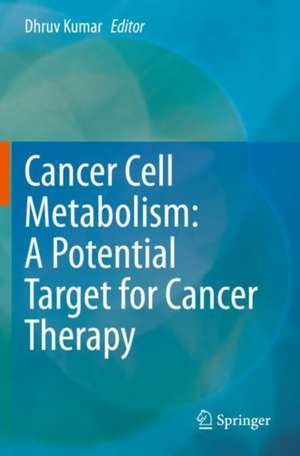Cancer Cell Metabolism: A Potential Target for Cancer Therapy
Editat de Dhruv Kumaren Limba Engleză Paperback – 14 feb 2021
| Toate formatele și edițiile | Preț | Express |
|---|---|---|
| Paperback (1) | 1046.40 lei 38-44 zile | |
| Springer Nature Singapore – 14 feb 2021 | 1046.40 lei 38-44 zile | |
| Hardback (1) | 989.57 lei 38-44 zile | |
| Springer Nature Singapore – 14 feb 2020 | 989.57 lei 38-44 zile |
Preț: 1046.40 lei
Preț vechi: 1101.47 lei
-5% Nou
Puncte Express: 1570
Preț estimativ în valută:
200.25€ • 207.80$ • 167.38£
200.25€ • 207.80$ • 167.38£
Carte tipărită la comandă
Livrare economică 14-20 martie
Preluare comenzi: 021 569.72.76
Specificații
ISBN-13: 9789811519932
ISBN-10: 9811519935
Pagini: 184
Ilustrații: XIII, 184 p. 29 illus., 22 illus. in color.
Dimensiuni: 155 x 235 mm
Greutate: 0.45 kg
Ediția:1st ed. 2020
Editura: Springer Nature Singapore
Colecția Springer
Locul publicării:Singapore, Singapore
ISBN-10: 9811519935
Pagini: 184
Ilustrații: XIII, 184 p. 29 illus., 22 illus. in color.
Dimensiuni: 155 x 235 mm
Greutate: 0.45 kg
Ediția:1st ed. 2020
Editura: Springer Nature Singapore
Colecția Springer
Locul publicării:Singapore, Singapore
Cuprins
Chapter 1: Cancer cell metabolism: Solid tumor vs non-solid tumor.- Chapter 2: Reprogramming of cancer cell metabolism: Warburg and Reverse Warburg hypothesis.- Chapter 3: Molecular aspects of cancer cell metabolism: Altered glycolysis and lipid metabolism.- Chapter 4: Understanding the metabolic cross-talk between cancer cells and cancer-associated fibroblasts.- Chapter 5: Metabolic cross-talk between cancer cells and tumor microenvironment.- Chapter 6: Role of autophagy in cancer cell metabolism.- Chapter 7: Role of c-Met/HGF axis in altered cancer metabolism.- Chapter 8: Recent advances in drug development targeting cancer metabolism.- Chapter 9: Clinical relevance of “Diagnostic markers” in cancer metabolism.- Chapter 10: Alterations in Metabolite-driven Gene Regulation in Cancer Metabolism.- Chapter 11: Role of Phytochemicals in Cancer Cell Metabolism Regulation.
Notă biografică
Dr Dhruv Kumar is an Associate Professor at the Amity Institute of Molecular Medicine and Stem Cell Research (AIMMSCR), Amity University Uttar Pradesh (AUUP), Noida, Uttar Pradesh, India. His current research is focused on cancer cell metabolism, tumour microenvironment, autophagy, exosomes, mutational heterogeneity, cancer prevention, NGS and bioinformatics.
He received his Ph.D. in Cellular, Molecular and Industrial Biology from the University of Bologna (UNIBO), Italy under an Indo-Italian Government fellowship in 2012. After completing his Ph.D., he pursued postdoctoral training at the University of Kansas Medical Center, Kansas City, USA. During this training, he worked towards understanding the molecular mechanism(s) of the regulation of autophagy and apoptosis in cancer stem cells (prostate, pancreatic and breast), as well as understanding metabolic crosstalk between the tumour microenvironment (Cancer Associated Fibroblast (CAF)) and Head and Neck Squamous Cell Carcinoma (HNSCC) via HGF/c-MET and bFGF/FGFR signalling pathways.
He has published several research articles in peer-reviewed international journals including Cancer Research, Scientific Reports, Genes, Radiation Research, Oncogenesis, Oncotarget, Cancer Letters, PlosOne, Pharmacology & Therapeutics, Biochemical Pharmacology etc., and has authored or co-authored numerous books and book chapters. He is a member of many international and national scientific societies and organizations and received several prestigious national and international awards including the Early Career Research Award, SERB, DST-India, K-INBRE Postdoctoral Award, National Institute of General Medical Sciences, National Institute of Health (P20 GM103418), USA, Young Scientist Award, International Academy of Physical Science, Allahabad, India, Brains in Competition Award, Institute of Advance Studies, University of Bologna, Italy, and the Indo-Italian Government Scholarship Award (Ministry of Human Resource and Development), India.
Textul de pe ultima copertă
This book illustrates various aspects of cancer cell metabolism, including metabolic regulation in solid tumours vs. non-solid tumours, the molecular pathways involved in its metabolism, and the role of the tumour microenvironment in the regulation of cancer cell metabolism. It summarizes the complexity of cancer cell metabolism in terms of the switch from anaerobic to aerobic glycolysis and how mitochondrial damage promotes aerobic glycolysis in cancer cells. The respective chapters provide the latest information on the metabolic remodelling of cancer cells and elucidate the important role of the signalling pathways in reprogramming of cancer cell metabolism. In addition, the book highlights the role of autophagy in cancer cell metabolism, and how metabolic crosstalk between cancer cells and cancer-associated fibroblasts promotes cancer cell progression. In closing, it summarizes recent advancements in drug development through targeting cancer metabolism.
Caracteristici
Reveals the molecular mechanism of metabolic regulation in cancer cells
Provides comprehensive, up-to-date information on different types of metabolic alteration in cancer cells with comparison to normal cells
Offers an authoritative account of the latest findings on all clinically approved and prospective anti-cancer drugs targeting the metabolic process and associated signalling pathways in the cancer cells
Provides comprehensive, up-to-date information on different types of metabolic alteration in cancer cells with comparison to normal cells
Offers an authoritative account of the latest findings on all clinically approved and prospective anti-cancer drugs targeting the metabolic process and associated signalling pathways in the cancer cells
